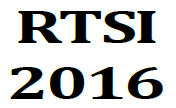2nd International Forum on Research and Technologies for Society and Industry
Research and innovation are the key enablers for structural and profitable changes towards a more sustainable economy able to create new job opportunities, as well as to fuel productivity and growth. Countries investing in research and innovation are more resilient to economic crisis, can better and more promptly react to the great societal challenges of our time, and perform better in the strong global competition that continuously and with unprecedented speed shapes economies and societies. Grounded on these evidences, the core purpose of this forum is to foster technological innovation and excellence in all the fields of primary interest for IEEE, including power systems, electronics, informatics, automation, and computer engineering, in order to promote the transition towards a vibrant innovation-based society. More specifically, the primary purposes of the RTSI series of events are:
– to promote and to strengthen partnerships and cooperation between academia and industry;
– to increase the public understanding and awareness of how engineering and technology can positively affect people quality of life;
– to promote discussion between the research community and related government bodies about effective and successful research policies;
– to disseminate recent advancements, research/technology solutions, and novel applications;
– to discuss inter-disciplinary ideas and to promote cross-fertilizing cooperation between researchers working in different research areas.
In order to achieve these goals and after the technical and audience success of the first edition, the technical program of this flagship event includes panels, technical sessions, tutorials, and exhibitions.
Panels are a fundamental feature of RTSI 2016. They are expected to bring together leading representatives from politics, industry, and academia for an interactive discussion about strategic issues. Specifically, the theme of the RTSI 2016 event “Technologies for smarter societies” is focused on how technology research and innovation can positively affect society, in terms of quality of life for individuals, better sustainability and quality of community living, and effectiveness and efficiency in managing smart society resources. Probable topics of panels for this edition will be: big data for smarter societies, IoT challenges and solutions, scalable and sustainable, ICT integration platforms, smart manufacturing, smart energy systems and buildings, ICT for green and green ICT, and innovative transportation solutions. In tutorials, experts present challenging or emerging topics to young researchers or to the wide public. To propose a tutorial please contact the tutorial chair danproto@unina.it Exhibitions encompass innovative world-class hardware/software solutions and products, e.g., representing the most significant and applicable results from international projects or industrial R&D, with special focus on solutions with a significant potential social impact. To propose an
exhibition please contact the exhibition chair paolo.bellavista@unibo.it The technical sessions focus on challenging and emerging issues in all the wide spectrum of IEEErelated primary areas of interest, by covering both theoretical aspects and practical applications.
The following Technical Sessions have been approved:
• 5G Communications: from the Radio Access to the Transport Network
• Algorithms, techniques, and architectures for Big-Data-Analytics-as-a-Service
• Biologically-inspired Models for Innovation in Medicine,
• Biorobotics and Rehabilitation
• Computational Intelligence Applications in Health and Smart Cities
• Cultural Heritage, Smart City, and Participatory Process
• Enabling Technologies for Measurement Challenges in Dual-use Scenarios
• ICT for a more Productive and Sustainable Bioeconomy
• IoT and Big Data: Efficient Management of Sensor/Cloud Integration
• Market-ready in Ten Years: Innovations for Smart Decentralized Power Generation
• Modeling Reliability and Safety with Applications
• Nanoelectronics and Nanoelectromagnetics for a Smarter Technology in Everyday Life
• New Frontiers in Adaptive Computing Systems
• New Materials and applications in magnetics
• Security and Privacy in Emerging Scenarios
• Smart Emerging Technologies for Industry 4.0
• Smart Grids and Smart Mobility for Smart Cities
• Wireless Power Transfer: Modeling and Applications



